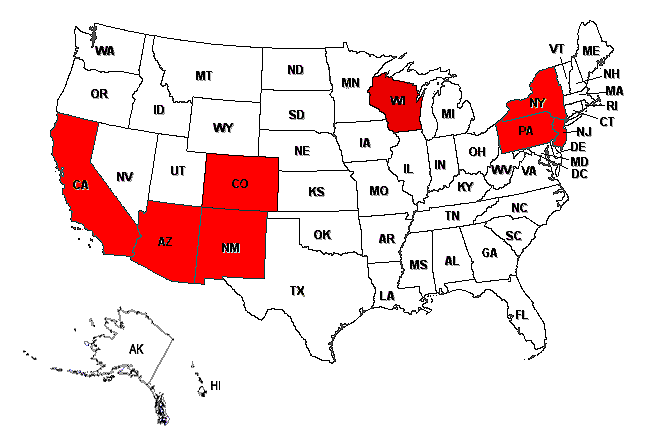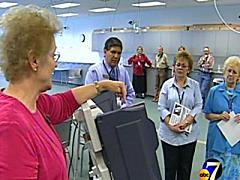Denver's populous suburban counties are in a state
of flux, with changing political allegiances that have the potential to
alter state politics. A surge in unaffiliated voter registration means
that Denver's suburbs are now neither Republican red nor Democratic blue,
but solidly purple.
At least for the most part.
Recent voter registration figures show that the number of Republican
voters has declined during the past two years in every suburban county,
while the number of unaffiliated voters has increased. The percentage of
Democrats has remained roughly the same in most counties.
The percentage of voters who don't sign up with either party has jumped
to 36 percent in Adams County, 39 percent in Boulder County, 36.3 percent
in Broomfield and 32.8 percent in Jefferson County.
It's these suburban unaffiliated voters who will determine who becomes
governor and which party controls the state legislature and the bulk of
Colorado's congressional delegation.
"I vote for the person," said Jan Mullen, a Lakewood Republican who
said she is increasingly disenchanted with her party. "I read all the junk
about the candidates that comes in the mail."
Mullen, who lives in a swing district that could determine which party
controls the state legislature, said she is barraged with mail that
attacks candidates on both sides.
"It's upsetting . . .," she said.
For years Jefferson County was a Republican stronghold, but now most of
the county's state legislators are Democrats. Republicans are still the
largest bloc of voters, with 37.4 percent, but Jeffco may be Colorado's
premier purple county.
"I don't think anybody could say it's a Republican county anymore,"
said Mary Alice Mandarich, a longtime Democratic activist who has worked
on campaigns in the county for more than two decades. "The demographics
and issues have changed."
Shifting political ground in suburbs
The suburbs' ticket-splitting ways became apparent in 2004, when
Arapahoe, Jefferson and Broomfield counties voted to re-elect President
Bush and to send Democrat Ken Salazar to the U.S. Senate. The suburbs'
independent streak seems to have deepened since then, judging by the spike
in unaffiliated voters.
While the decline in Republican registration has excited Democrats,
their party has just held its own in the percentage of registered voters
in most of the suburban counties. There is still a clear lead in
Republican registration numbers in Arapahoe, Douglas, Jefferson and
Broomfield counties.
"You don't see a surge in Democratic registration; what that suggests
is these folks are willing to split tickets and look at the person," said
Denver pollster Floyd Ciruli. "The Democrats still have to prove
themselves."
For years, Colorado politicians have known that elections in this state
are won and lost in the Denver suburbs. With 2 million residents, Denver's
sprawling suburban counties easily outvote urban Denver and rural
Colorado.
Once the political makeup of these counties was regarded as fairly
fixed, with Boulder and Adams counties usually going Democratic, and
Jefferson, Arapahoe and Douglas counties reliably Republican. The state
GOP had a solid band of voters extending along the western and southern
flank of the metro area that often helped Republican candidates coast to
victory, but that seems to be changing.
Ciruli said the shifting political ground in the suburbs is driven by
demographics. Most of the suburban counties have become more racially and
economically diverse over the past few years.
Since 2000, U.S. Census Bureau figures show that the Hispanic
population, in particular, has ballooned in the suburbs.
In Adams County, Hispanics went from 28 percent to 35 percent of the
population, with 139,000 Hispanics now living there.
In Arapahoe County, the Hispanic population rose from 12 percent to 16
percent in the first half of this decade; the county now has 85,000
Hispanic residents. Smaller increases were recorded in the other suburban
counties.
"The inner-ring, older suburbs like Lakewood, Aurora, Arvada and Wheat
Ridge are getting more diverse with working-class and poorer people moving
in," Ciruli said.
At the same time, many of the older suburbs have found themselves
dealing with the same types of urban problems that Denver has faced for
years.
"There's a blending of the needs and concerns of the inner suburbs and
the inner city," said Ciruli, noting that the Republican mayors of
Lakewood and Aurora now frequently work with Denver Mayor John
Hickenlooper, a Democrat, on a variety of issues.
"People like to think of the suburbs as wealthy, white and Christian -
that's not the case at all," said Republican political consultant Katy
Atkinson. "The suburbs have become very diverse.
"The conventional wisdom about the suburbs may be wrong."
Dems may catch a break
Atkinson said many suburbanites who voted Republican in past years may
be willing to "give the Democrats a chance" this fall.
"People are on the fence," she said. "The Democrats haven't closed the
deal. Republicans will have to work hard to get suburban votes."
The Republicans are strongest in the so-called "exurbs," low-density
areas at the fringe of a big city. Douglas County may be the best example
of a local exurban county, and Republicans still comprise just over 50
percent of the county's voters.
The change in party affiliation in suburban counties during the past
two years may be linked to the increasingly unpopular war in Iraq.
Recent polling by the Rocky Mountain News and CBS 4 revealed
that Colorado voters are upset about the war and unhappy with the status
quo in Washington. Fifty-nine percent of voters surveyed disapproved of
the job President Bush is doing. Several suburban voters interviewed by
the News said they were unhappy with Bush.
"It feels like America is on its own," said Joseph O'Meara, a
39-year-old unaffiliated Centennial voter. "We've alienated most of the
world. The president's address was another scolding to the international
community, 'You're with us or against us.' "
Others fear that U.S. soldiers now find themselves in the middle of a
civil war in Iraq.
"We got ourselves into a civil war, and we're never going to solve it,"
said Kristin Vasey, a 34-year-old Highlands Ranch Democrat. "We're trying
to police the world."
National polls reveal that a crucial swing vote in this election are
so-called "security moms," suburban mothers who voted to re-elect Bush
because they thought he was the best candidate to deal with terrorism.
Many of those women now say they've lost confidence in the president.
"Voting for Bush was a mistake," said Lisa Sanchez, of Lakewood, a
35-year-old unaffiliated voter and mother of two. "I won't be voting for
the Republicans this time."
Others say they still believe in Bush's ability to take on the
terrorists.
"I support our president," said Martha Gray, a 62-year-old Lakewood
Republican. "I'd rather fight the terrorists over there than here. I think
it's a situation that needs to be taken care of."
Many suburban voters also believe the economy is not doing as well as
economic reports indicate. They say many employers are cutting back on
health benefits and people are working longer hours to pay their mortgage.
"A lot of my friends are working 60 hours a week to maintain their
lifestyle," said Hope Belloni, a 39-year-old unaffiliated Castle Rock
voter. "$300,000 for a house is not affordable housing."
steerss@xxxxxxxxxxxxxxxxxxxxx
or 303-954-2282








